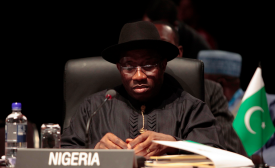africa
Today, American and French diplomats are preparing for talks with Iran that build on the agreement that has halted progress on and rolled back key elements of the Iranian nuclear program. French and American officials share information daily to combat terrorism around the world. Our development experts are helping farmers across Africa and on other continents boost their yields and escape poverty.
Today, American and French diplomats are preparing for talks with Iran that build on the agreement that has halted progress on and rolled back key elements of the Iranian nuclear program. French and American officials share information daily to combat terrorism around the world. Our development experts are helping farmers across Africa and on other continents boost their yields and escape poverty.
Recent developments in Africa related to the contentious topic of homosexuality have reminded me of a discussion that took place during one of the interactive sessions at CPD’s 2013 Summer Institute in Public Diplomacy. During this discussion, I argued that the West needs to fully recognize and show respect to the cultural, religious, and sociological demagogy of countries (especially in Africa) opposed to the practice. This is especially true when promoting the acceptance of homosexuality as a human right.

Recent developments in Africa related to the contentious topic of homosexuality have reminded me of a discussion that took place during one of the interactive sessions at CPD’s 2013 Summer Institute in Public Diplomacy. During this discussion, I argued that the West needs to fully recognize and show respect to the cultural, religious, and sociological demagogy of countries (especially in Africa) opposed to the practice. This is especially true when promoting the acceptance of homosexuality as a human right.
AFRICAN PERSPECTIVE
In Maputo, the “Garden for Sculptors” behind the Museu Nacional de Arte on Avenida Ho Chi Minh has become a kind of prison yard for Mozambique’s various Ozymandiases, a semi-public dumping ground where colonial monuments now crumble quietly away. A marble European baroness reclines in thick robes, the grasses growing up around her base.
The adoption of Tunisia’s new constitution should set in motion a wide-ranging overhaul of laws and public institutions, Al Bawsala, Amnesty International, and Human Rights Watch said today. The constitution, which guarantees many fundamental rights and freedoms, should be implemented in a way that will provide the highest degree of protection of Tunisians’ human rights.
As cyber-currency magnates promote bitcoins festooned with hypnotic barcodes, spare a thought for the officially non-existent nation of Somaliland. Its 3.8 million inhabitants insisted that something more inspirational adorn their country’s equally tenuous global tender and bankroll its quest for global recognition. So they went with goats, sheep and the often petulant dromedary camel.
The Kenyan writer and graduate student at Harvard Law School Nanjala Nyabola recently caused a bit of a stir with her Al Jazeera article asking "Why Do Western Media Get Africa Wrong?" Reading through the piece, which was both interesting and informative, I couldn't help but wonder: Just who does get Africa right? Is there even such a thing as getting Africa right?







